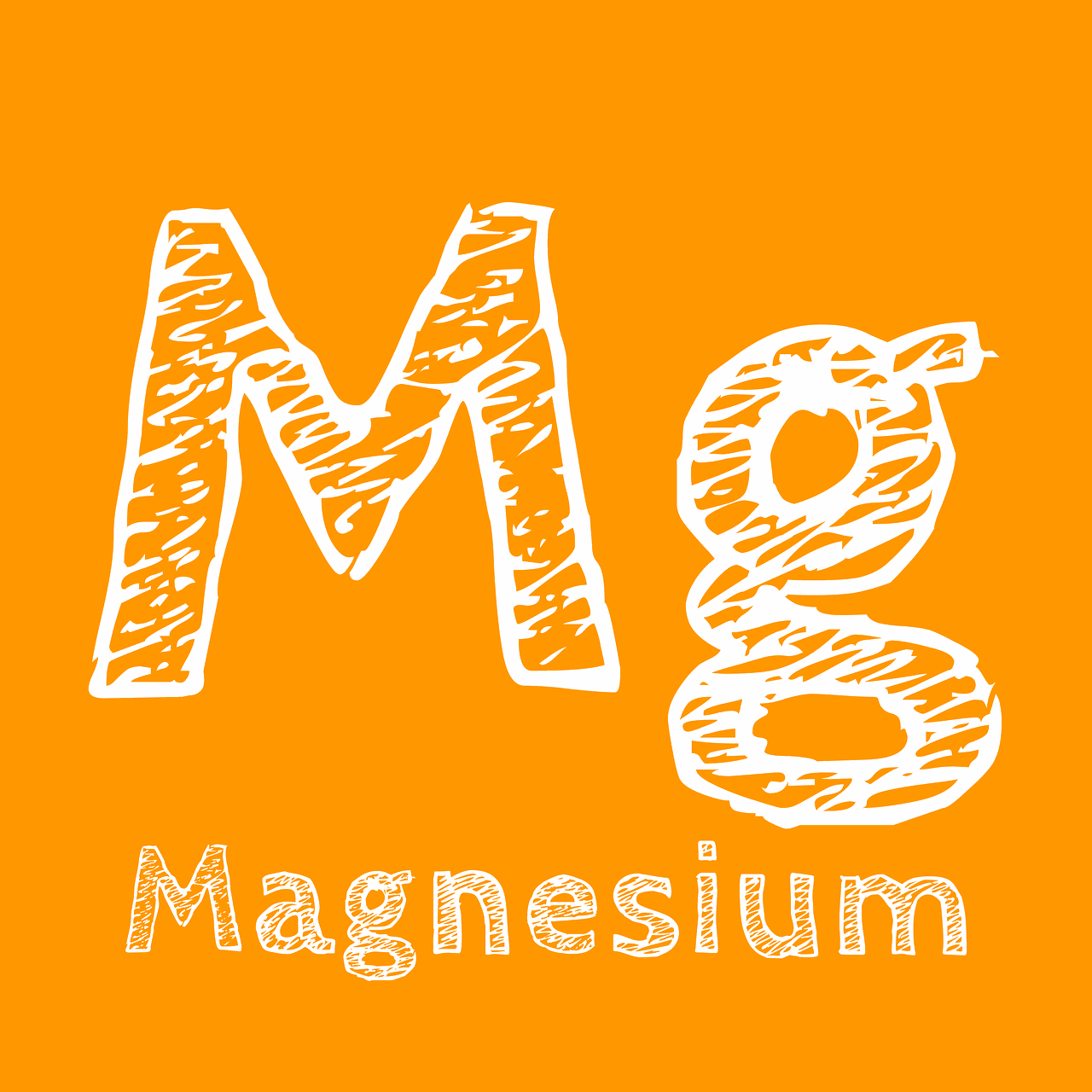Magnesium glycinate is a chemical composition of two components: magnesium and glycine. Magnesium glycinate is one of the organic forms of magnesium. It is recommended for the goal of replenishing magnesium deficiencies or increasing the supply of this element. It dissolves well in water and is assimilated by the body.
Magnesium is one of the most essential chemical elements for the proper functioning of the human body. Magnesium in the human body has many essential functions that affect human health. Magnesium deficiency causes metabolic, cardiovascular, and neuromuscular disorders. Its excess also has adverse effects.

Glycine, on the other hand, is an endogenous amino acid. The human body produces glycine, but this ingredient can also be supplemented. Glycine also has many valuable functions. The properties of glycine mean that it shows positive effects when combined with magnesium in many situations.
Of all the available magnesium forms, magnesium glycinate is the best tolerated and, therefore, safe. However, knowing the side effects, dosage standards, and properties is worth knowing to reduce the risk of any symptoms. Remember that it is best to consult your doctor about each supplement, especially if you regularly take medications.
Magnesium attaches to a different substance, forming a bioavailable compound for the body. In this case, it combines with glycine![]() . Magnesium glycinate consists of two glycine molecules and one magnesium molecule. It can also be found under the name magnesium glycinate or magnesium bis-glycinate and is used as a goal to supplement magnesium deficiencies. It is well tolerated in high doses. Magnesium combined with glycine has additional benefits. These belong to:
. Magnesium glycinate consists of two glycine molecules and one magnesium molecule. It can also be found under the name magnesium glycinate or magnesium bis-glycinate and is used as a goal to supplement magnesium deficiencies. It is well tolerated in high doses. Magnesium combined with glycine has additional benefits. These belong to:

There are various magnesium supplements. Magnesium is combined with various ingredients, including glycine. So, what distinguishes glycine? It has been noted that magnesium combined with glycine is much better absorbed than different magnesium combinations.
Magnesium glycinate is very well absorbed because it is bound to an amino acid; it does not have to go through normal absorption pathways or compete with other minerals for absorption into the bloodstream. Magnesium, in combination with glycine, is one of the best bioavailable sources![]() of magnesium. For this reason, the laxative effect of this form of magnesium is minimal. Of all the available magnesium forms, magnesium glycinate is the best tolerated and, therefore, safe.
of magnesium. For this reason, the laxative effect of this form of magnesium is minimal. Of all the available magnesium forms, magnesium glycinate is the best tolerated and, therefore, safe.
Magnesium, in combination with glycine, has one important additional function. Glycine protects the mucous membranes of the stomach and intestines from irritation. That's why magnesium combined with glycine is a supplement recommended for people with sensitive stomachs or irritable bowel syndrome![]() .
.
In addition, magnesium glycinate does not increase intestinal peristalsis, so it will be well tolerated by people prone to diarrhea. It is essential in magnesium supplementation, as different magnesium combinations can cause side effects in diarrhea. In contrast, the magnesium glycinate form is the safest choice to supplement magnesium in the body.
Glycine also has a positive effect on the central nervous system![]() . Glycine regulates the function of receptors that are found in nerve cells. By attaching to the receptors, glycine slows the flow of ions, quieting the nervous system. Magnesium also regulates receptors, so it will be doubly beneficial in combination with glycine.
. Glycine regulates the function of receptors that are found in nerve cells. By attaching to the receptors, glycine slows the flow of ions, quieting the nervous system. Magnesium also regulates receptors, so it will be doubly beneficial in combination with glycine.
In addition, glycine supplemented at night reduces the feeling of fatigue after little sleep. Glycine can improve sleep quality and reduce insomnia. Clinical studies have shown that magnesium supplementation significantly increases sleep duration, sleep efficiency, and natural levels of melatonin, which are necessary for its regulation. Moreover, studies have demonstrated reduced considerably stress hormones in those taking magnesium.

Magnesium activates more nerve connections in the brain, contributing to improved memory and increasing concentration![]() . Magnesium also increases neurotransmitter activity, which makes the brain work faster and more efficiently. Magnesium combined with glycine additionally influences excellent sleep quality, making the patient able to do tasks that require reproducing information from memory more effectively.
. Magnesium also increases neurotransmitter activity, which makes the brain work faster and more efficiently. Magnesium combined with glycine additionally influences excellent sleep quality, making the patient able to do tasks that require reproducing information from memory more effectively.
Glycine is a compound that affects the functioning of the nervous system. Improving the transmission of signals to the nervous system improves its functioning and benefits concentration and memory. Therefore, combining magnesium and glycine has more significant benefits for the nervous system.
Magnesium supplementation results in a reduction in blood pressure proportional to the dose used. The hypotensive effect is more potent in people with baseline high blood pressure and using hypotensive drugs. In addition, glycine can improve the body's ability to utilize nitric oxide, an important molecule that increases flow and lowers blood pressure. Magnesium glycinate supplementation mainly affects the cardiovascular system, reducing the possibility of conditions like heart disease![]() .
.
A deficiency of this element can cause muscle cramps. If we have a magnesium deficiency in our body, cramps appear. Therefore, supplementation of any magnesium will help deal with unpleasant muscle cramps. Studies have also been done on pregnant women, in whom the ailment of muscle cramps is common. In the study, magnesium glycinate significantly reduced the frequency of muscle cramps![]() , and the women did not experience any negative gastrointestinal symptoms.
, and the women did not experience any negative gastrointestinal symptoms.
Glycine also supports the immune system. It supports calcium absorption![]() and participates in the synthesis of erythrocytes and hemoglobin. Meanwhile, the overall magnesium level in the blood is an essential determinant of the immune system's effectiveness in fighting pathogens and cancer cells. Magnesium makes the immune system more efficient in eliminating cancerous or virus-infected cells. Well-absorbed magnesium glycinate is, therefore, extremely beneficial to the immune system.
and participates in the synthesis of erythrocytes and hemoglobin. Meanwhile, the overall magnesium level in the blood is an essential determinant of the immune system's effectiveness in fighting pathogens and cancer cells. Magnesium makes the immune system more efficient in eliminating cancerous or virus-infected cells. Well-absorbed magnesium glycinate is, therefore, extremely beneficial to the immune system.

Magnesium glycinate is one of the well-absorbed and safe forms of magnesium supplements. It has a high bioavailability and has no gastrointestinal side effects, even with prolonged use. Therefore, it is one of the best dietary supplements for children and pregnant women.
Magnesium glycinate can be taken in various forms. The supplement is available in effervescent, coated, or powdered tablets. Magnesium glycinate is water soluble, so it should be sipped or dissolved in water. Each time you take magnesium, it will be fine. However, it is worth considering when magnesium will be best absorbed, for magnesium will be best absorbed by the body after eating a protein-rich meal.
Whether you eat such a meal, taking magnesium during or immediately after it is a good idea. If, on the other hand, you want to improve the quality of your sleep, take magnesium glycinate just before going to bed. Magnesium absorption in the intestine is affected by the acidic environment, which is influenced by protein, unsaturated fatty acids, vitamin B6, sodium ions, lactose, and vitamin D.

Magnesium supplementation is essential in the course of cardiovascular disease. Large doses are given intravenously after a heart attack as an anticoagulant. However, the optimal single dose is 60 mg, given several times daily. The maximum dosage may vary depending on the patient's weight, age, and gender. Magnesium requirements are expressed in milligrams.
Generally, the daily dose of magnesium for women is 310 mg![]() , while for men, it is 400 mg
, while for men, it is 400 mg![]() . In children, the dosage also needs to be specially adjusted according to the child's age and development. It is assumed that in infants, it is 30 mg
. In children, the dosage also needs to be specially adjusted according to the child's age and development. It is assumed that in infants, it is 30 mg![]() per day; in children up to the age of 3, about 80 mg
per day; in children up to the age of 3, about 80 mg![]() . At ages between 4 and 8, magnesium requirements increase to 130 mg
. At ages between 4 and 8, magnesium requirements increase to 130 mg![]() .
.
These values may vary depending on the individual needs of the body, lifestyle, and possible diseases or physiological conditions, such as pregnancy. Magnesium is vital to keep your body working well, and it isn't easy to provide the required daily dose, so supplementation is necessary.

Of all the available forms of magnesium, magnesium glycinate is the best tolerated and, therefore, safe. However, like each supplement, it can have side effects. It's always a good idea to consult your doctor about magnesium supplementation. You can also research this by testing magnesium levels in your body.
Knowing the deficiency values will make choosing the correct magnesium glycinate dose easier. Despite the many benefits of magnesium glycinate, all can be poisoned at high doses. The side effects we have listed are risk factors for magnesium glycinate overdose. Side effects thus include:
Excessive doses of magnesium can cause gastrointestinal side effects. These can include nausea and diarrhea![]() , among others. Taking magnesium with a meal, not on an empty stomach, is an excellent way to reduce the risk of symptoms.
, among others. Taking magnesium with a meal, not on an empty stomach, is an excellent way to reduce the risk of symptoms.
Mild hypermagnesemia usually does not cause any symptoms. Magnesium taken in proper doses regulates heart muscle function. However, if a significant overdose of magnesium is taken, breathing problems, chest pain, arrhythmia![]() , hypotension, and an irregular or even slow heartbeat can occur.
, hypotension, and an irregular or even slow heartbeat can occur.

Magnesium deficiency adversely affects kidney function![]() , but excess magnesium is also inadvisable. Excess magnesium in the body is rare. It can be caused by abnormal excretion of magnesium by the kidneys, which happens in cases of kidney disease. Therefore, if magnesium causes deterioration of kidney function, it may indicate some problems in this area. However, magnesium glycinate, thanks to the presence of the amino acid, prevents the kidneys from excreting magnesium too quickly.
, but excess magnesium is also inadvisable. Excess magnesium in the body is rare. It can be caused by abnormal excretion of magnesium by the kidneys, which happens in cases of kidney disease. Therefore, if magnesium causes deterioration of kidney function, it may indicate some problems in this area. However, magnesium glycinate, thanks to the presence of the amino acid, prevents the kidneys from excreting magnesium too quickly.
Magnesium affects the regulation and optimization of the hormones responsible for sleep, namely serotonin and melatonin. Be careful, however, as excess magnesium can have the opposite effect. Hypermagnesemia, a condition associated with excess magnesium in the body, can lead to confusion![]() or lethargy
or lethargy![]() . It depends on the case. High magnesium levels are often associated with reduced calcium levels, impairing normal neuromuscular excitability. Therefore, one should be careful with magnesium intake in case of insomnia so as not to lead to an overdose.
. It depends on the case. High magnesium levels are often associated with reduced calcium levels, impairing normal neuromuscular excitability. Therefore, one should be careful with magnesium intake in case of insomnia so as not to lead to an overdose.

Adequate magnesium levels positively affect our well-being and perform many useful bodily functions. To maintain proper magnesium levels, taking care of your diet and eating foods rich in magnesium is essential. However, it can be difficult for many people these days. Magnesium deficiency is a common concern that patients are often unaware of. Instead, the lack of an adequate amount of it has a negative impact on health and causes various ailments.
The causes of reduced magnesium levels can be multiple. These include insufficient amounts of magnesium in the diet, but it also reduced absorption from the gastrointestinal tract and excessive loss from the body. To prevent it, it is worth taking care of proper supplementation. However, when deciding to start supplementation, it is worth exercising caution and consulting your doctor or pharmacist about this intention. Symptoms indicative of magnesium deficiency include:

Magnesium stabilizes nervous system function and improves gray cell function, which is essential for proper nervous system function, stress resistance, fatigue, and improved memory and thinking. Therefore, magnesium deficiency can cause severe fatigue and weakness. Magnesium deficiency is often associated with constant fatigue and lack of energy. Thus, if you are experiencing chronic fatigue, consider whether it is a magnesium deficiency.
Cramping can be caused by lacking magnesium. The magnesium we have in our body is found within our muscular system. If we supply ourselves with insufficient amounts of it and suffer from deficiencies, muscle strains and cramps follow, particularly affecting athletes and physically active people. Long-term magnesium deficiency can cause neuromuscular ailments, such as uncontrolled muscle spasms, tingling, and tremors in the arms, legs, lips, or eyelids. Such symptoms may, therefore, be indicative of magnesium deficiency.
Both excess magnesium and magnesium deficiency negatively affect heart function. Low magnesium levels can also cause heart rhythm disorders such as atrial fibrillation and, in extreme cases, ventricular tachycardia. Therefore, in some cases, your doctor may recommend magnesium for palpitations. Magnesium regulates the muscle function of the arteries and heart muscle. Its proper level affects the adequate flow of blood through the vessels. Magnesium also plays an important role in the contraction and diastole of the heart. Therefore, taking care of adequate magnesium levels in the body is worthwhile.
Magnesium has a significant effect on the central nervous system. Therefore, a deficiency of this element can hurt mental health. Magnesium deficiency makes people more prone to stress and irritability. A lack of magnesium can lead to depressive states![]() , trouble focusing, and concentration disorders. Long-term magnesium deficiency can cause serious health problems and even contribute to mental disorders. Mood swings, irritability, anxiety disorders
, trouble focusing, and concentration disorders. Long-term magnesium deficiency can cause serious health problems and even contribute to mental disorders. Mood swings, irritability, anxiety disorders![]() , or indefinite restlessness can mean that we are deficient in magnesium. It's good news because replenishing it will make you feel better quickly.
, or indefinite restlessness can mean that we are deficient in magnesium. It's good news because replenishing it will make you feel better quickly.

Magnesium deficiency can also contribute to excessive hair loss and brittle nails. When we supply our hair with inadequate or insufficient magnesium, it is weakened, which is immediately noticeable in the multi-faceted deterioration of its condition. Hair becomes brittle, brittle, and may also fall out and split at the ends. In addition, magnesium deficiency can significantly affect the condition of nails. As a result, nails, similar to hair, become more brittle.
A lack of magnesium in the body can negatively affect sleep function. Firstly, it can make it more difficult to fall asleep. Secondly, lack of magnesium can also affect the quality of sleep. If we are overtired, we sleep more shallowly, causing us to wake up sleepless and lacking energy.
Stress hormones can be overproduced due to a lack of magnesium. These, in turn, are a stimulus to the brain, ordering it to work harder. If the cortisol levels and different stress hormones are too high, we become agitated, focused, and ready for action. In such a situation, our brain cannot calm down, so there is no way we can fall asleep quickly.
Magnesium is a nutrient that performs many vital regulatory functions in the human body. However, it does not mean that its supplementation is recommended for each. It is always a good idea to start by modifying your diet and including products that are sources of magnesium and many different nutrients.
According to official recommendations, dietary supplements cannot substitute for a varied diet. Therefore, it is always advisable to start with dietary modification, and supplementation should only be considered when this proves ineffective. Another legitimate reason is a deficiency found in a laboratory test. However, when deciding to start supplementation, it is worth exercising caution and consulting this intention with your doctor or pharmacist. Magnesium glycinate is recommended for supplementation because it is the safest form of magnesium.

Magnesium is a nutrient found in many foods. Among the richest sources of it are nuts, whole grain cereal products, some vegetables, and fruits. Glycine, on the other hand, although not nutritionally essential, is needed for the proper functioning of the body. Slight deficiencies of glycine in the diet do not result in serious health consequences but may disrupt specific metabolic processes. The diet's glycine sources can be any product with a high protein content. Thus, glycine will be provided by animal products and plant products rich in protein, such as legumes.
Various forms are used to increase magnesium levels in the body. Among the most common choices is magnesium glycinate. It is the best form of biologically absorbed, as it contains glycine, a protein amino acid with a straightforward structure. Magnesium glycinate is one of the organic forms of magnesium, which has many advantages and benefits. Combining magnesium with glycine reduces the risk of side effects such as diarrhea.
Magnesium glycinate is commonly available in tablet type or powder to be mixed with water. Magnesium is best taken during or after a meal. Supplementation can be helpful for magnesium deficiencies that cause unpleasant symptoms. Before supplementing with magnesium glycinate, it is a good idea to consult a doctor who will select the appropriate daily dose of the product. This aspect mainly concerns patients taking medications that interact with magnesium, interfering with its absorption.
Caution associated with supplementation is essential, as excess magnesium can cause many side effects. Ensuring a proper magnesium-rich diet before starting supplementation is a good idea.